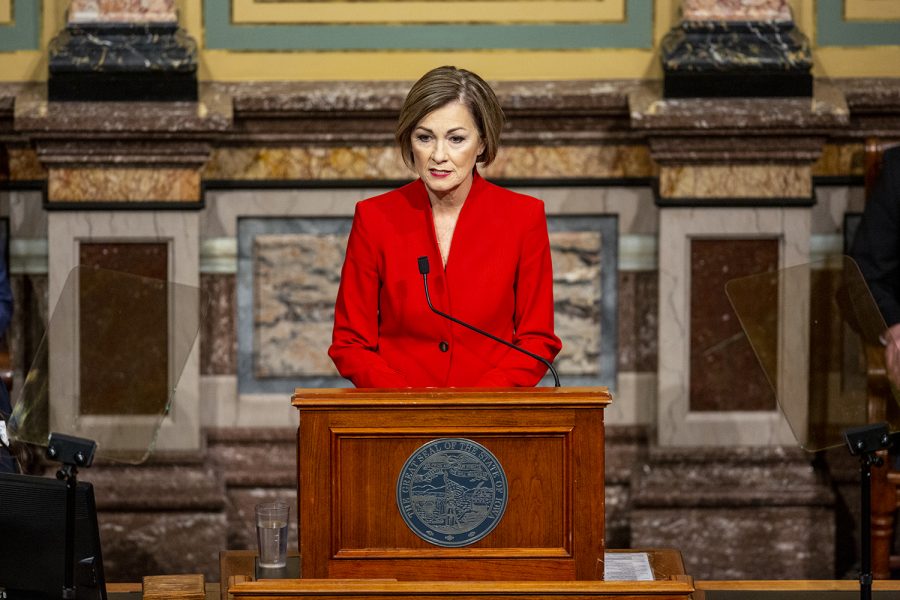Gov. Kim Reynolds to take action against vaccine passports in Iowa
Reynolds said during a Wednesday press conference she will pursue either legislative or executive action to prohibit certain institutions from requiring proof of vaccination.
Gov. Kim Reynolds gives the State of the State address in the house chamber of the Iowa State Capitol on Tuesday, Jan. 12, 2021 in Des Moines. Gov. Reynolds highlighted in the address expansion of broadband internet, a push for in-person learning, and economic recovery from the COVID-19 pandemic.
April 7, 2021
Gov. Kim Reynolds said during a Wednesday press conference she plans to take either legislative or executive action against the use of vaccine passports in Iowa – a form of proof some businesses and colleges across the nation are looking at using to ensure that employees and students are vaccinated.
“Since the start of the pandemic, I’ve consistently put my trust in Iowans to do the right thing rather than demand or mandate it, and vaccination is no different,” Reynolds said. “While I believe in the efficacy of the vaccine enough to get it myself and encourage Iowans to do the same, I also respect that it’s a personal choice. I strongly oppose vaccine passports and I believe that we must take a stand as a state against them.”
The New York Times reported on April 6 that requiring proof of vaccination for a voluntary vaccine is likely legal, but raises ethical questions for some. Some state governors, like Texas’ Greg Abbott have already prohibited state-funded institutions from requiring proof of vaccination.
According to the UI’s coronavirus webpage, the university won’t require students or faculty to be vaccinated when they return for the fall 2021 semester. The UI does require that students show proof of two MMR vaccines — which protect against Measles, Mumps, and Rubella.
Reduced vaccine allocation
Reynolds also said during the conference that the state of Iowa will receive significantly smaller allocations of the Johnson & Johnson vaccine over the next two weeks.
Reynolds said the White House COVID Response Team informed governors across the nation yesterday that states should expect fewer incoming shipments of the Johnson & Johnson vaccine until the end of the month, when the nation’s weekly supply should reach 8 million doses.
Though Reynolds didn’t name a specific reason for the reduction, this is likely a result of the manufacturing mistake a Baltimore plant responsible for vaccine production made last week which contaminated 15 million doses of the Johnson & Johnson vaccine.
Reynolds announced last week that a selection of colleges across the state, including The University of Iowa, will be receiving allocations of the Johnson & Johnson vaccine to distribute among students and staff before the summer holiday.
“We’ll adjust our plans accordingly over the next few weeks, but J&J will continue to be allocated for college vaccinations and others who may benefit from a single dose vaccine,” Reynolds said. “By doing this, we’re ensuring college students and young adults are vaccinated as soon as possible, and that will help keep the virus activity low and manageable until a higher percentage of Iowans are fully vaccinated.”



